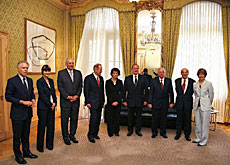
Leuthard to take over economics ministry

The newly-elected government member, Doris Leuthard, is to take over as economics minister – the first time a woman has held the post.
Cabinet on Friday announced that she would succeed Joseph Deiss, who is to step down at the end of next month.
All other cabinet members decided to remain in their current ministries.
Leuthard, a member of the House of Representatives and president of the Christian Democratic Party, said she was pleased with her portfolio.
“It’s the right place for me,” she said.
The 43-year-old was elected to the cabinet in a joint session of both houses of parliament on Wednesday.
As head of the economics ministry she will be in charge of trade, labour, agriculture and vocational training, as well as matters as diverse as veterinary and rent issues.
Free trade, unemployment
In her new post, Leuthard will have to draft plans for an agreement with the European Union on free trade on agriculture.
Lowering trade barriers by allowing parallel imports and the unilateral adoption of EU product standards are other major tasks.
Also on her agenda are plans to shore up the unemployment scheme and the funding of innovation projects.
In a first reaction, the Trade Union Federation said it hoped Leuthard would pursue a policy aimed at reducing unemployment – which currently stands at 3.3 per cent – and improving job prospects for the young generation.
The Swiss Business Federation, economiesuisse, said it was optimistic that Leuthard’s political views would be an asset to the Swiss economy.
Leuthard’s Christian Democratic Party announced the cabinet decision would help ensure stability and continuity in the economics ministry.
Seniority
The president, Moritz Leuenberger, said it took cabinet only five minutes to agree on the portfolios of the seven cabinet ministers.
According to the principle of seniority Leuthard, a lawyer by profession, had last choice and was therefore left with the economics ministry.
There had been speculation ahead of the meeting that the defence minister, Samuel Schmid, might wish to take over the economics portfolio. Rumour has it that Justice Minister Christoph Blocher is seeking to change to another ministry.
Observers widely expect a cabinet reshuffle next year following regular cabinet elections in December 2007.
swissinfo with agencies
The Swiss government is made up of seven cabinet ministers, which are elected by parliament and have to be confirmed for a four-year term.
Since 1943 the cabinet has consisted of representatives of the four main political parties.
The centre-left Social Democrats, centre-right Radicals and the rightwing Swiss People’s Party currently hold two seats.
In 2003 the Christian Democrats lost one of their two seats to the People’s Party.
The post of Swiss president is allocated on a rotating basis and is largely ceremonial.

In compliance with the JTI standards
More: SWI swissinfo.ch certified by the Journalism Trust Initiative





























You can find an overview of ongoing debates with our journalists here . Please join us!
If you want to start a conversation about a topic raised in this article or want to report factual errors, email us at english@swissinfo.ch.